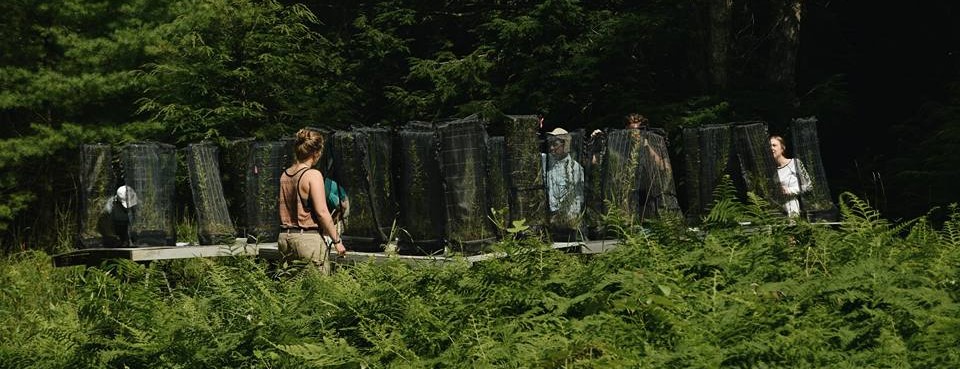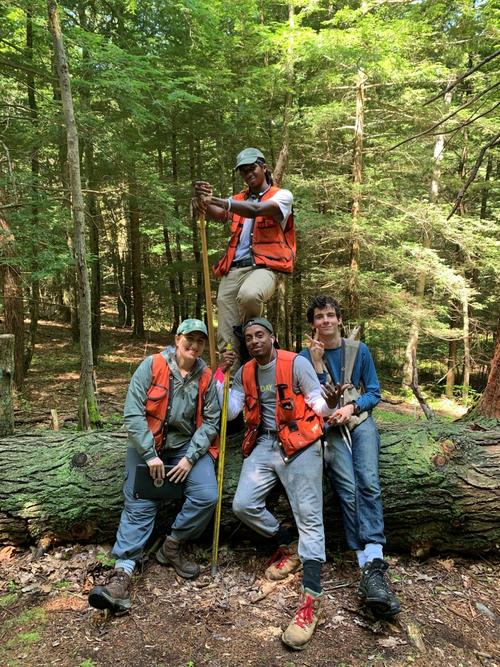Ingalls Field Ecology Program
Summer Field Ecology Internship

The Yale School the Environment invites undergraduate students to spend the summer gaining hands-on experience in field ecology research through the Louise H. and David S. Ingalls Field Ecology Program.
In 2026, the program will run from May 26-August 1. The Ingalls program is based at the Yale-Myers Forest camp in northeastern Connecticut. Interns are matched with professors, post-doctoral researchers, and graduate students on a current research project in field ecology. Working in teams, participants will collect and/or analyze field-based ecological data. In the process, interns will gain knowledge, and skills related to their research subject area, as well as to working outdoors. Housing is provided.
Work - and life - is largely conducted outdoors during the summer in New England, which includes traversing uneven terrain, heat, humidity, rain, a variety of insects, and sometimes cold. Yale-Myers Forest is located in a rural landscape - though the cities of Hartford, Providence, Boston, and New Haven are within 1-1.5 hrs drive, the forest itself can feel remote, especially if you have not spent time in rural areas before. If you are interested in the program but uncertain about living or working with any of those elements, we would still like to hear from you! We are happy to discuss further about whether the program is a good fit, and how we might accomodate your needs.
The 2026 application period will open on January 12th and will close on February 8th at 11:59pm. For questions, please contact YMFresearch@yale.edu.
Details about the program and the application process can be found below:
Research Projects for 2026
Research plans for the 2026 field season are still developing, and exact projects may be subject to change. At present, we expect that interns will work on the following:
Long-term research in silviculture & forest ecology:
Working with the Silviculture Lab, interns will work on a variety of studies looking at the influence of environment and land-use on ecological communities. Studies include monitoring regeneration vegetation in shelterwood treatments and surveying floristic patterns across the Yale-Myers Forest. Students will learn and practice plant identification and forest mensuration skills while collectin data on several long-term studies that have shaped scientific understanding of how the forests of our region grow and develop.
Regionally-adapted agroforestry systems:
Students will work on the USDA-funded ADAPT project, which focuses on advancing climate-smart and sustainable agriculture in New England through regionally adapted agroforestry systems. Responsibilities will include assisting with the setup, implementation, and monitoring of field experiments across multiple agroforestry systems. These activities include transitions from open fields to forested systems, tree-crop planting and fencing within shelterwood enrichment plantings, and planting within Experimental Linear Gaps (ELGs). Students will also gain hands-on experience collecting site-level microclimatic data, including soil moisture, soil temperature, and light intensity, across different experimental sites.
Location, Food & Lodging
Interns will live within the vibrant summer population of the Yale-Myers Forest camp — a small, close-knit community of researchers and graduate student apprentices in forest management. Bunkhouse housing is available on-site free of charge for all interns. Food (including hot dinners and ingredients to make breakfast & lunch) are provided during the work week for a cost which varies yearly, but is usually about $12-15/day. A portion of the stipend is ($500) is intended to offset this cost, and is disbursed at the start of the summer so that interns can pay in advance for the cost of meals.
There are ample opportunities for recreation such as canoeing, swimming, hiking, and generally enjoying a beautiful location. Camp has electricity and wifi. Yale-Myers Forest camp is located 40 minutes from Hartford, and is within a 1.5 hour drive of Boston, Providence, and New Haven.
Qualifications
The Ingalls internship is open to current undergraduate students, and those graduating in May 2026. Applicants must be enrolled at a US college or university, or be a US citizen or permanent resident - unforunately, we are not able to provide visa support for international students who are not already enrolled at a US university. The program is intended for students who are looking for research experience to further their academic and professional goals. Some coursework in ecology, environmental science, or forestry is useful, but not required.
Funding
All interns will recieve a stipend, either from the program, or from their home institution (if available). The stipend amound for 2026 is $6,000 - $500 of which is intended to offset the cost of food during the program.
Applicants who have access to summer internship or research funds from their home institution are expected to pursue those funds concurrent with their application. If you are unsure whether your school offers summer funding, it is often helpful to speak with your advisor or someone in your department. We are happy to support you in applying for funds, and we will bridge any gap between funds from your school and the $6,000 stipend total. Please reach out if you are considering applying for the internship and are preparing internal funding applications for your college or university. Many fellowships require letters of support from sponsors, so please contact us to talk about your application early in the process.
Applicants whose home institutions do not offer funding for summer research or internships will be fully funded by the Ingalls program.
Yale students should apply concurrent for this internship with other Summer Funding Opportunities. These can be found on the Yale Fellowship and Funding Database. Some fellowships that our students have received include the EVST Summer Fellowship ; First year Yale students should also consider the First Year Summer Research Fellowship in the Sciences and Engineering . In addition, the Richter Summer Fellowships are available through the residential colleges.
To Apply
Applications for the 2026 season are due by end of day on February 8th. After submitting an application, you may be asked to have an interview with program staff or a research project lead. We expect to notify applicants of decisions in mid-March. If you need an update on the status of your application before March, please contact us.
There are two parts to your application:
- Complete an online application form
- Submit your supporting materials (see below) via email to YMFResearch@yale.edu
Until you have submitted both parts, your application is not complete & will not be reviewed.
Supporting Materials Checklist:
Please email the materials below as a single word (.doc or .docx) or pdf document to Laura Green (Research & Extension Forester) at YMFresearch@yale.edu. Please include “Ingalls” in the title of your email, and please title your application materials document as “YourName_IngallsApplication_2026”.
- CV or resume, including relevant coursework and contact information (phone, email, and mailing address)
- Unofficial transcript
- Personal Statement / Letter of Interest (500–1500 words): This is an opportunity for you to help us get to know you and why you are interested in the Ingalls program. We are particularly interested in the following:
- Your academic, personal, and/or professional interests in ecology,
- What you hope to learn during this program,
- Your background and personal experiences, and how they intersect with your interest in ecology and this program,
- Your career and personal objectives.

A group of the 2019 Ingalls Field Ecology Interns at their field site. Photo by D. Woodbury.